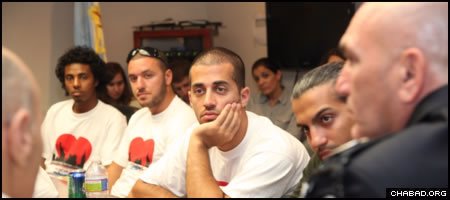Wounded Israeli veterans touring the Mid-Atlantic and Northeastern United States headed to the nation’s capital for a two-day series of meetings and tours at the U.S. Holocaust Memorial Museum, the White House, the Israeli Embassy and other sites inside the Beltway.
The June 9 and 10 stops came as part of a 12-day tour that began with the 10 former soldiers’ arrival in New York City. Organized by the Chabad Israel Center of the Upper East Side and the Chabad-Lubavitch Youth Organization in Israel’s Terror Victims Project, the Belev Echad trip – its name translates to “with one heart” – brought the group to Washington to allow people living in America to express gratitude for their sacrifices.
Maor A., an elite Givati Brigade soldier who was wounded during Operation Cast Lead in 2009 when a bullet pierced his right arm and left it paralyzed from the elbow down, was touched by the exhibits at the Holocaust museum.
“This is exactly what we soldiers fight for,” he said, “to be certain that nothing like this can ever occur again. The loss of my arm’s use was worth the sacrifice.”
After touring the White House, the soldiers headed to the Israeli Embassy, where they were addressed by Senior Israel Police Attaché Uri Bar-Lev. Having lost a leg in the service of his country, Bar-Lev spoke with authority.
“Every Israeli knows what it means to be a soldier,” he stated, his words piercing with meaning in light of recent events. “Israel’s army is like one family. Our soldiers fight on Israeli land, on Israel’s very borders, and therefore, our victories are vital.”

Rabbi Uriel Vigler, director of the Chabad Israel Center, began planning for the trip in November. His organization raised nearly $100,000 to pay for all of the functions, room and board, from a broad swath of supporters in New York.
In Washington, he injected some optimism into a discussion between Bar-Lev and 12-year-old Adam Lassner, who accompanied the group from New York. Lassner asked the police official how the world would be different in five years, to which Bar-Lev replied: “We will still be fighting over the same issues. They will take more than five years to resolve.”
“That’s one answer,” countered Vigler, before invoking the long-awaited day when there would be no more war.
“Of course,” replied Bar-Lev with a smile. “May [it] come right now.”




Join the Discussion